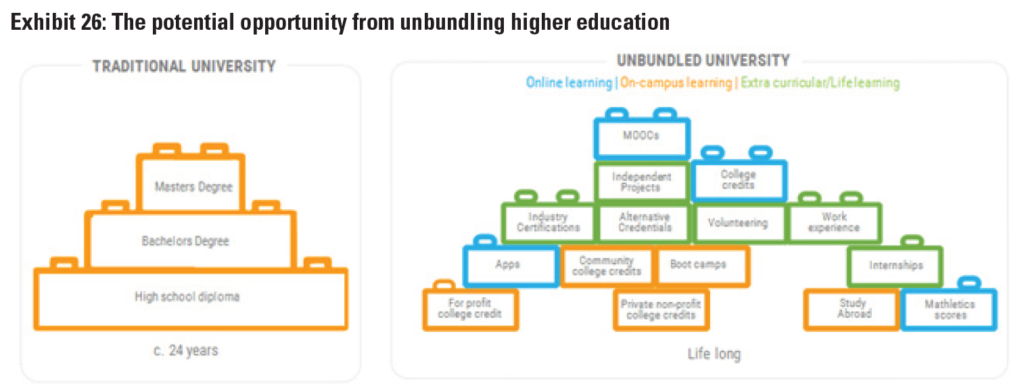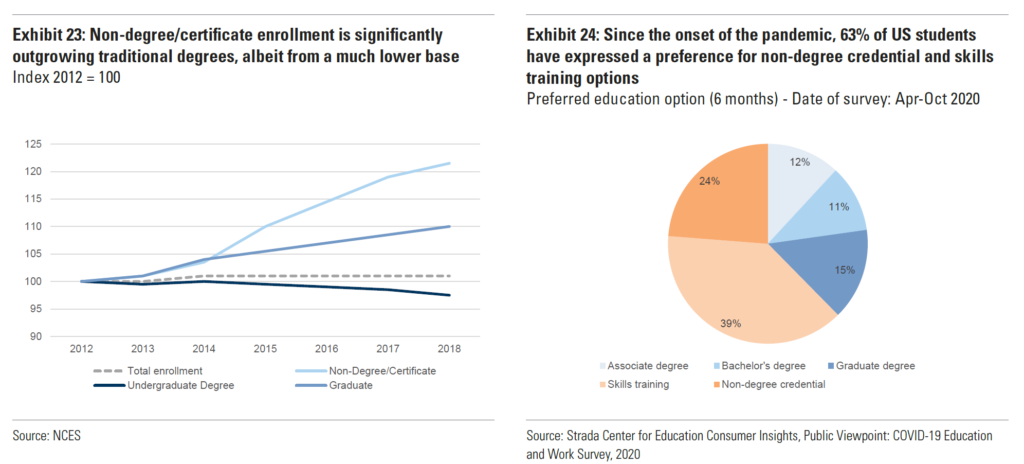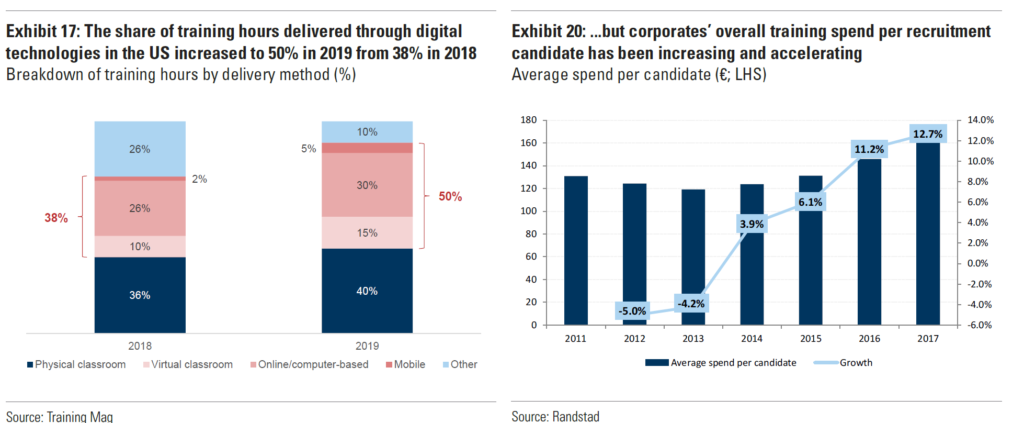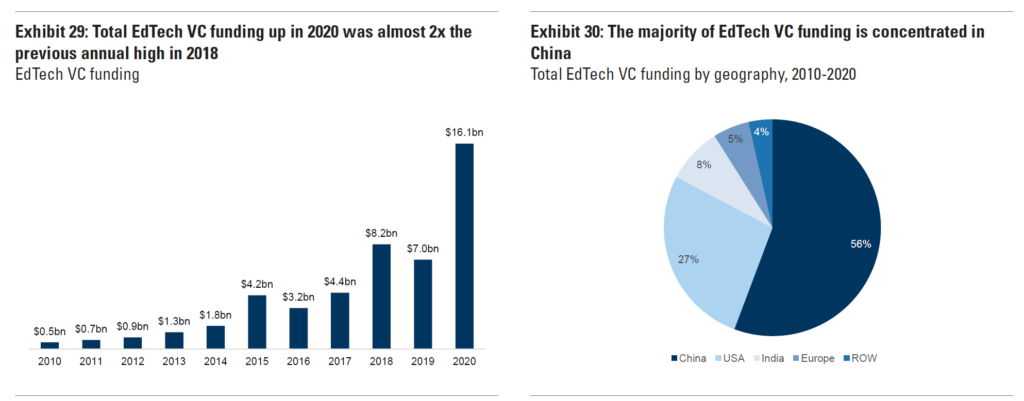Last week, we commented on the likely persistence of the post-pandemic “new normal” in technology, mentioning specifically remote work and e-commerce. In both cases, covid pulled forward years of technological change in the space of a few months.
We believe that even though new covid variants will pose challenges, humanity is in the process of learning to live with this virus as an endemic reality. Current Delta variant news notwithstanding, medical science will continue to develop effective covid therapeutics, and day-to-day life will continue to return to normal. We have dealt with endemic diseases in the past. Modern biotechnology puts us in a much better position to deal with them today, and we will.
Remote work and e-commerce are therefore coming off the blistering pace of pandemic-inspired growth. Workers are going back to the office, and consumers are going back to brick-and-mortar stores. But there will now be a permanently elevated trend of remote-only workers, and many businesses will permanently implement hybrid remote and in-office work structures. Likewise, the trajectory of app-based on-demand delivery, and the whole suite of pandemic-inspired contactless retail solutions, has permanently inflected upward. The “new normal” will not be an instant transformation, but it will be looked back on as a watershed for many businesses.
The same holds true for another major industry that has been profoundly affected by the pandemic: education technology.
Ed Tech: It’s Not Just K–12 and College
At the height of pandemic lockdowns, some 90% of developed-world students were learning remotely. As workers have begun to return to their offices, students have begun to return to their classrooms — but as a hybrid onsite/remote structure is becoming the norm for office workers, the same kind of hybrid structure is becoming the norm in education — so-called “blended learning.” This bodes well for many education technology companies, as well as for those legacy education companies which can pivot their offerings to digital education.
As was the case with remote work and e-commerce, the trend to online education and training has been underway for a long time. Prior to the pandemic, however, the public’s attention was largely focused on K–12 and university education — particularly on the adoption of fully-remote degree options for university students.
Under the hood, though, the more interesting trend has been the development of online training modules intended to inculcate specific skills. A nonprofit platform that pioneered this trend is Khan Academy, where interested users have free access to a wide variety of course materials that they can use at their own pace to engage in a wide range of academic topics. There are now many for-profit platforms that have expanded Khan Academy’s model, appealing to users looking to spend their time online in a more constructive way than gaming or social media, sometimes offering all-you-can-eat access to an ever-expanding range of short courses for a nominal price. In our view, this is a socially and economically positive avenue of self-development, to say the least.
In a world where job performance depends increasingly on specific technical skills in rapidly changing disciplines, many companies — particularly tech companies — are more concerned about skills and ongoing training for their cadres than they are about old-line credentials such as university-granted degrees.
The deeper aspects of this trend suggest that what’s underway is a fundamental transformation of the university and its relation to society and industry.
Taken together, modular training and certification suggest a disintermediation of legacy educational institutions is underway. The nonprofits like Khan Academy showed that the model was feasible. The arrival of other actors — including legacy education companies such as Pearson [PSO], tech firms such as Amazon [AMZN] and Alphabet [GOOG], and university-aligned digital-first entrants such as recently IPOed Coursera [COUR] as well as others who remain private — will add curation, formality, and widely recognized certification to digitally delivered training.
This process will “unbundle” four-year university education into something that much more resembles a formal system of vocational training.

Source: Goldman Sachs Investment Research
We believe that the traditional four-year undergraduate education is in the process of rendering itself irrelevant. As we wrote last week, traditional degree programs are coming under increasing fire for their expense and their career irrelevance — particularly in non-technical fields.
We’ve argued that the U.S., and particularly those students who genuinely aspire to career success and entrepreneurialism, would be better served by a vocational system more akin to the German model, where secondary-level students are separated into academic and vocational tracks. The vocational system partners with industry and has historically been successful at placing graduates in technical trades — a system which has helped keep Germany at the forefront of global precision manufacturing and other high-tech sectors. This system produces more desirable job candidates than the four-year indoctrination in faddish academic conceits that is now prevalent at many U.S. universities at an exorbitant price-tag.
A system more like Germany’s is beginning to emerge organically in the United States. There will remain elite bastions of liberal education which are more or less beholden to current academic fads, attended by elite students whose families will bear the expense for the sake of prestige, networking, and eventual sinecures in academia, government, NGOs, or Beltway consultancies.
There will also be elite technically oriented schools to provide deep training in the hard sciences, mathematics, computer science, and engineering. However, even academically gifted ordinary students who want career prospects and saleable skills without taking on excessive debt — and without needing to sit through the politicized “struggle sessions” that have replaced the classical humanities in many universities — will increasingly turn away from these institutions, and towards the emerging tech-mediated training and certification systems. Students actually prefer this model:

Source: Goldman Sachs Investment Research
This new wave of education technology will be taken up by corporates and used to expand their digital training for employees. This trend was already in place, and already accelerating: both overall training spending for staff, and the digital delivery of that training. (We note that there is still a huge runway for this transition to occur, with half of training still delivered in a physical classroom.) The increase in hybrid office/remote work structures alone will further accelerate corporate demand for digital training.

Source: Goldman Sachs Investment Research
Amazon [AMZN], Salesforce [CRM], IBM, and Microsoft [MSFT] all offer free skills modules; they are beginning to partner with ed-tech companies to add certifications for those who complete the modules and pass exams. A user can train on Amazon Web Services, with content delivered by Coursera [COUR], EdX, Udemy, or Trailhead, and then complete an online exam proctored by Pearson [PSO], and come away with a recognized credential in networking, security, machine learning, data analytics, sysops, or devops, for a fraction of the price one would pay for in-person classes — let alone the price one would pay at a community or four-year college.
The Biden administration’s education push is focused on community colleges, and much of this funding is likely ultimately to accrue to the same ed tech enablers — since much of the training will be delivered digitally.
Finally, we note that there is a large amount of global venture capital being deployed in this area. The recent ed tech debacle in China is likely to result in much of that capital seeking opportunities in the United States, the U.K., and Europe.

Source: Goldman Sachs Investment Research
Investment implications: Above we have mentioned some of the enablers of education technology. Coursera [COUR], which we have often mentioned in the past, recently came public, and while we would counsel patience in the face of a high valuation, it is a company that investors should monitor for their buy list in the event of a correction. Investors should also monitor ed tech unicorns (valuation greater than $1 billion) that remain private, particularly Udemy, Duolingo, Course Hero, Udacity, Guild Education, and Age of Learning. We would steer clear of Chinese ed tech until the regulatory and political situation becomes clear.
Please note that principals of Guild Investment Management, Inc. (“Guild”) and/or Guild’s clients may at any time own any of the stocks mentioned in this article, and may sell them at any time. In addition, for investment advisory clients of Guild, please check with Guild prior to taking positions in any of the companies mentioned in this article, since Guild may not believe that particular stock is right for the client, either because Guild has already taken a position in that stock for the client or for other reasons.







